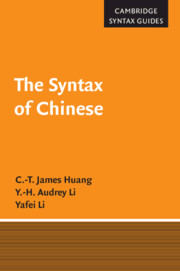9 - Anaphora
Published online by Cambridge University Press: 05 June 2012
Summary
Much research in grammatical theory has shown that syntax plays an important role (together with semantics and pragmatics) in governing the possible referential meanings of nominal expressions. Three factors enter into the proper characterization of the syntax of anaphora: (a) the nature of the nominal expression in question (whether it needs a linguistic antecedent or not); (b) the structural relation between the expression and its antecedent if it has one; and (c) the nature of the antecedent itself.
In the generative literature, a distinction is made between three NP-types on the basis of their ability or inability to directly refer: anaphors, pronouns, and R-expressions. In Chinese, reflexive expressions like ziji ‘self’ and combinations of pronouns + ziji like taziji ‘himself,’ nimenziji ‘yourselves,’ etc. are anaphors since they are incapable of directly denoting entities in the outside world, but must each rely on a linguistic antecedent for their reference to be established. Personal pronouns like ta ‘he/she’ or tamen ‘they’ may be deictic (used without antecedents) or anaphoric (requiring antecedents). Other noun phrases (Zhangsan, zhe-ge xiaohai ‘this child,’ etc.) are R(eferential)-expressions, which do not require an antecedent for their reference to be established.
The possibility and location of an antecedent for a given expression is governed by structural principles, most prominently represented by the principles of Binding Theory in Chomsky (1981) and its subsequent developments.
- Type
- Chapter
- Information
- The Syntax of Chinese , pp. 329 - 371Publisher: Cambridge University PressPrint publication year: 2009



